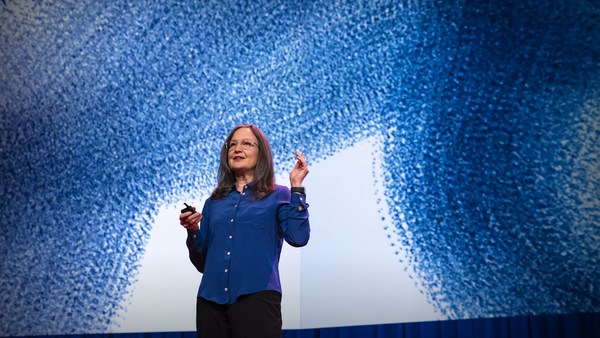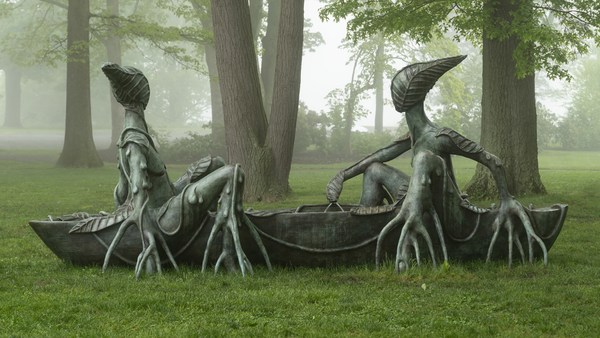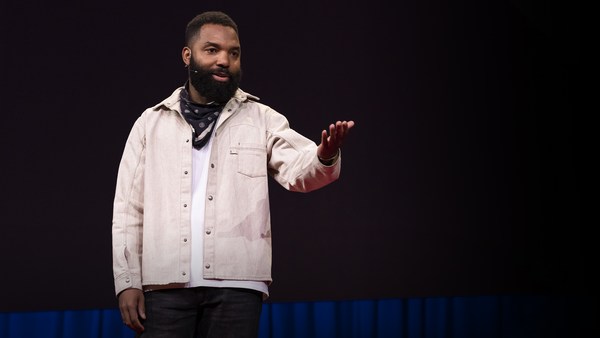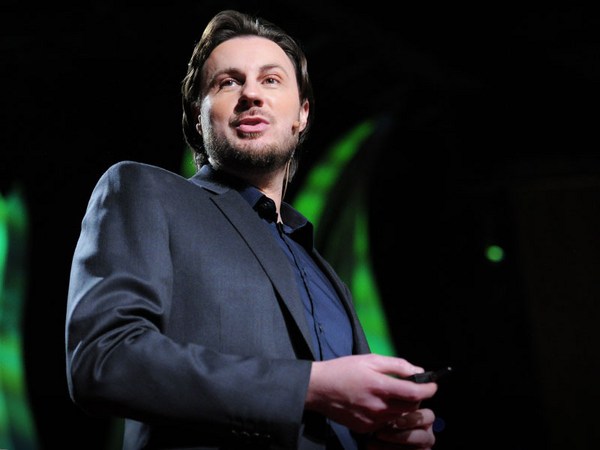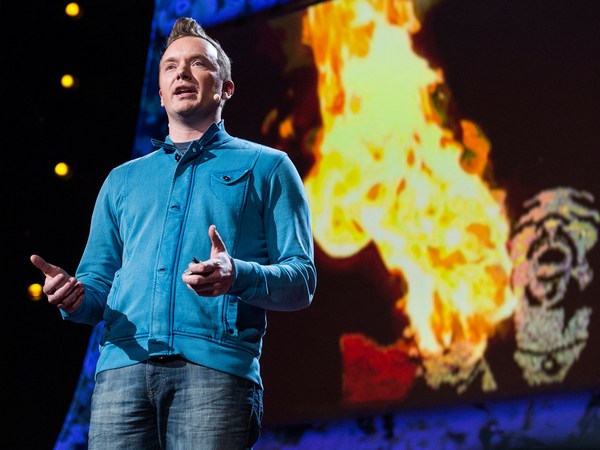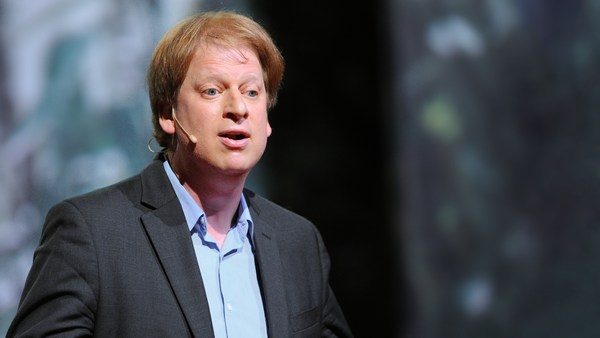Every day I speak to my beautiful and brilliant cousin Orna, who lives in Israel. In normal times, we talk about which cousin is the bigger idiot, which honey cake recipe to use, which books we're reading, the family stories from Belarus -- this is not Orna, these are other people in Belarus. The conversations are a beacon for me, and they fill my soul and enter my books.
The other day, Orna brought up a Romanian philosopher named Emil Cioran. He was a miserable insomniac who drove everyone nuts because of this.
(Laughter)
That's actually my favorite book of his, but the better title, the more accurate translation, is "On the Inconvenience of Being Born."
(Laughter)
So he was relentless in talking about how horrible it was to be alive. And he did this until the age of 85, when he died, which is incredibly ironic.
(Laughter)
But I must give him credit. He does bring up the essential dilemma: why are we here, for what purpose? But today, I don't really want to dwell on the morose. Let's talk about other things.
That's not the right slide.
(Laughter)
That's the right slide.
[On death]
(Laughter)
So here's Proust. Dead, obviously -- or you think he's sleeping, but he's dead -- from a series of paintings that I’ve done called “Dead in Bed,” which includes Tolstoy and Chekhov, of course. In normal times -- and these are not normal times, these are grim times when the world is awash in war and killing -- but in normal times, I have a routine. In the early morning hours, with a strong cup of coffee, I read the obituaries. The infusion of coffee and biography affords me a way to reflect. And it might seem too soon in the day to start with such a tremendous topic. But it is a jolt to action because it reminds me how fragile and how vulnerable we all are, and how quickly our lives can end.
The night is different. Then I watch an endless stream of murder mysteries, preferably British. Watching them is the kind of solace. I call this the murder and mint chip portion of the day.
(Laughter)
We have a problem, we solve the problem. People seem briefly upset by the murders, so many in every episode. But there is no time to brood because they have to film the next episode. And they all seem to say, “Get on with it.” And the idea of prevailing over evil is my lullaby, and I sleep.
But what of the day that lies ahead? Every one of us invents the day. Every single day is invented. The actual first day was 13.8 billion years ago, more or less. And maybe with the information from the Webb telescope, we can actually see the beginning of time, which is an incomprehensible idea, of course. But what does that perspective afford us when contemplating which tutu to wear or which insult to respond to or what book to write?
Sometimes the day is too long, excruciatingly long, and I get out of bed, I look longingly at the bed and I say to the bed, I will be back soon.
(Laughter)
And in between, there are things to know and things to not know. Here is a map of the United States made from memory by my mother, Sarah.
(Laughter)
Sarah was the dean of American history at Harvard.
(Laughter)
Actually not.
(Laughter)
Her family fled the pogroms of Belarus for Palestine in the 1930s, and in 1954 our family moved to New York City. Her acute sense of the absurd permeated everything in our life in the best way possible. This map for me is the gold standard of knowledge. Knowledge as imagination, knowledge as humor, knowledge as not giving a damn what the correct answer is to anything, ever.
(Laughter and applause)
Sarah, this is Sarah, did not speak that much. Really, she was of few words, and we really listened to her. And what are the obvious assets of not speaking? So many. No worries about repeating yourself or boring others.
(Laughter)
Or boring yourself or being misunderstood. No regrets of having said something inconsiderate or too considerate, or too banal or too provocative, or just plain stupid and altogether insufferable. That is what happens when we speak, it is inevitable. No justification at all for saying much of what we say. And if we examine this notion to its ultimate conclusion, obviously the answer is no more dinner parties.
(Laughter)
“Wait,” you say, “None at all? What if the Tolstoys invite me?” who are pictured here.
“Sure, but have you hung out with the Tolstoys?”
"Or what if Antony and Cleopatra invite me? Should I attend?"
“OK,” I say. “But at your own peril. You know what happened to them.”
(Laughter)
On the other hand, if you are invited, and let's just say, it's really lovely to be invited, you never know what you're going to see that will be a painting, or hear, that might be a story, some fragment, some gesture, an image of a dog sitting on a green chair in front of radishes and flowers. And let's not forget connectedness, congeniality, conviviality, camaraderie, bonhomie, merriment, laughter. What is wrong with that? Nothing, absolutely nothing.
(Applause)
I used to be ashamed of my inconsistencies. Now I revel in them. Everything is in conflict, everything has an opposite, you are not bound to be one thing, a truly liberating notion for me. You might tell the truth or you might lie. You might be kind or unkind, selfish or generous, quick or thick. And in the midst of that confusion and that tumult, the work blossoms.
To have meaningful work is a salvation, and one of my greatest pleasures is to stare at things, and my children always say that I get too close to people, strangers on the street, and just stare at them, at their features, because I'm so entranced. So I have to be pulled away a little bit. But then I can go into my studio and report on what I have encountered. And then, as a bonus, the bliss of mixing colors, of being alone and listening to music and going into another world. Here is a painting from a visit that I did to Cézanne's studio. The walls are painted gray. This is the recipe for any of those who need it: black, white, ochre and aquamarine. Now, as a talisman, every painting I do includes Cézanne gray.
Writing, of course, is different. Finding the idea, plucking a word out of the air. But which word? And then a sentence, but which sentence? And then a paragraph, and which paragraph? And it never stops, so many words. I could not live without both painting and writing, and one supports the other in obvious ways. In both, the struggle is invisible but palpable. I say the tears are invisible, but they're definitely there. How do I deal with never good enough? Easy. [On self-loathing]
(Laughter)
“Self-loathing” is a truly ugly expression, but it is an unavoidable condition. The crushing anxiety of not getting it right, of not finding the truth, of feeling worthless. If you look at it one way, it could be helpful to have doubt and dismay. Plowing through the muck of despair leads to a sense of humanism and perseverance.
On the other hand, how absurd and tedious to be in the grips of self-doubt. What a waste of time, that insidious insecurity. What of finding your work and your place on Earth? What of self-confidence? What of the bliss of finding the right color or the right word? What of sheer joy? What is wrong with that? Nothing, absolutely nothing.
After reading the obituaries, I go for a walk, which is a salvation. Here is Robert Walser, who wrote one of my favorite books called "The Walk," which I highly suggest you read. Walking and not thinking is the favorite state. An empty brain, which I call my best brain, is the only way to have any ideas, to allow surprises to appear. “Solvitur ambulando,” they thought of this before I did, long ago. Walking solves all problems without trying. Walking leads to the pleasure of sitting, perhaps on a bus going down Fifth Avenue, and looking at the entire world around you with a great sense of well-being.
One day at a farmers market, I saw a woman carrying an absolutely gigantic cabbage.
(Laughter)
When I asked to photograph her, she looked really annoyed.
(Laughter)
And for some reason, I was so delighted by her crankiness. It seemed so authentic and true. Let's just say what we feel. It made me think of all the things women hold, literally and metaphorically. Balloons and grudges.
(Laughter)
And heavy loads and cabbages. And stupendous love and courage. And the pink ukulele under a cherry tree. And from this a book was formed: “Women Holding Things”. What do women hold? The home and the family and the children and the food. The friendships, the work, the work of the world and the work of being human, the memories and the troubles and the sorrows and the triumphs and the love. Men do as well, but not quite in the same way.
Sometimes when I'm feeling particularly happy or content, I think I can provide sustenance for legions of human beings. I can hold the entire world in my arms. Other times, I can barely cross the room. And I drop my arms, frozen. There is never an end to holding, and certainly there is often the feeling of never doing enough. And then there is the next day and the next day. And one holds on.
I dreamt someone else was stupid for a change.
(Laughter)
Such a relief.
(Laughter)
Albeit a fleeting one.
A few years ago, I did an illustrated edition of "The Autobiography of Alice B. Toklas," written by the inimitable Gertrude Stein. Alice and Gertrude lived a singular life, one of intense creativity and equally intense domesticity, and one could not exist without the other. That, to me, is the ideal of life, family and work. My son Alex and I made a short film called "My Name is Alice B. Toklas," and for a brief day I became Alice with two extra noses on my nose. Here is a short clip from the end of the film.
[Picasso was an Idiot]
(Piano music in background)
(Video) It took Picasso 90 sittings to paint Gertrude Stein's portrait. Nobody thought it looked like her, but he said, "Don't worry, it will." But actually, I don't know if he knew anything about what he was talking about oh, you know, Picasso, he was impossible.
(Laughter)
Thank you very much.
Oh, this looks delicious. Absolutely delicious.
(Laughter)
(Piano music ends)
(Applause)
The hot dog was delicious, and dancing down Fifth Avenue was a complete joy. And as we say in our family, doing almost everything in the strangeness of life through the sorrows of life, live.
Thank you very much.
(Applause and cheers)
